Potřebujeme váš souhlas k využití jednotlivých dat, aby se vám mimo jiné mohly ukazovat informace týkající se vašich zájmů. Souhlas udělíte kliknutím na tlačítko „OK“.
ASTM D5598-01(2012)
Standard Test Method for Evaluating Unleaded Automotive Spark-Ignition Engine Fuel for Electronic Port Fuel Injector Fouling
Automaticky přeložený název:
Standardní zkušební metoda pro hodnocení Bezolovnatý Automotive zážehového motoru Palivo pro elektronické Port paliva zanesení trysek
NORMA vydána dne 1.11.2012
Informace o normě:
Označení normy: ASTM D5598-01(2012)
Poznámka: NEPLATNÁ
Datum vydání normy: 1.11.2012
Kód zboží: NS-31817
Počet stran: 12
Přibližná hmotnost: 36 g (0.08 liber)
Země: Americká technická norma
Kategorie: Technické normy ASTM
Kategorie - podobné normy:
Anotace textu normy ASTM D5598-01(2012) :
Keywords:
deposit control additive, deposits (in internal combustion engines), driveability, electronic port fuel injector (PFI), flow rate, fouling, fuel rail, hot soak, pintle, spark-ignition engine fuel, ICS Number Code 75.160.20 (Liquid fuels)
Doplňující informace
| Significance and Use | ||||||||
|
5.1 Test Method—Deposits are prone to form on the metering surfaces of pintle-type electronic fuel injectors. These deposits reduce fuel flow through the metering orifices. Reductions in metered fuel flow result in an upset in the air-fuel ratio, which can affect emissions and driveability. When heavy enough, these deposits can lead to driveability symptoms such as hesitation, hard starting, loss of power, or a combination thereof, that are easily noticed by the average driver and lead to customer complaints. The mechanism of the formation of deposits is not completely understood. It is believed to be influenced by many factors, including driving cycle, engine design, port fuel injector design, and composition of fuel used. The procedure in this test method has been found to build deposits in injectors on a consistent basis. The deposits formed by this procedure are similar to the deposits experienced in the field in terms of composition and in amount of deposition. This procedure can be used to evaluate differences in unleaded base fuels and fuel additives. 5.1.1 State and Federal Legislative and Regulatory Action—Legislative and regulatory activity, primarily by the state of California6 and the Federal Government5.1.2 Relevance of Results—The operating conditions and design of the engine and vehicle used in this test method are not representative of all modern automobiles. These factors must be considered when interpreting test results. 5.2 Test Validity: 5.2.1 Procedural Compliance—The test results are not considered valid unless the test is completed in compliance with all requirements of this test method. Deviations from the parameter limits presented in Section 5.2.2 Vehicle Compliance—A test is not considered valid unless the vehicle has met the quality control inspection requirements in accordance with 8.2. |
||||||||
| 1. Scope | ||||||||
|
1.1 This test method covers a vehicle test procedure to evaluate the tendency of an unleaded spark-ignition engine fuel to foul electronic port fuel injectors (PFI). 1.2 The test method is applicable to unleaded spark-ignition engine fuels which may contain antioxidants, corrosion inhibitors, metal deactivators, dyes, deposit control additives, and oxygenates. 1.3 The values stated in SI units are to be regarded as the standard. The values in parentheses are provided for information only. 1.4 This standard does not
purport to address all of the safety concerns, if any, associated
with its use. It is the responsibility of the user of this standard
to establish appropriate safety and health practices and determine
the applicability of regulatory limitations prior to use.
Standard Specification for Mineral
Spirits (Petroleum Spirits) (Hydrocarbon Dry Cleaning Solvent) Standard Specification for Automotive
Spark-Ignition Engine Fuel (Includes all amendments and changes
12/14/2023). MC 96.1 Temperature Measurement Thermocouples Title 1—Provisions for Attainment and Maintenance of
National Air Quality Standards, Clean Air Act Amendments of 1990
Public Law 101-549, Nov. 15, 1990. Clean Air Act Amendments of
1990, Available from Superintendent of Documents, U.S. Government
Printing Office, Washington, DC 20402. |
Podobné normy:
Historická
15.7.2011
Historická
15.6.2013
Historická
1.10.2013
Historická
1.5.2013
Historická
15.6.2013
Historická
1.5.2013
Doporučujeme:
Aktualizace technických norem
Chcete mít jistotu, že používáte pouze platné technické normy?
Nabízíme Vám řešení, které Vám zajistí měsíční přehled o aktuálnosti norem, které používáte.
Chcete vědět více informací? Podívejte se na tuto stránku.


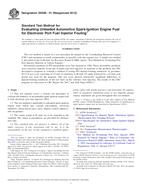
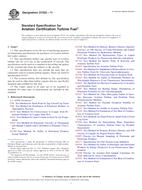 ASTM D7223-11
ASTM D7223-11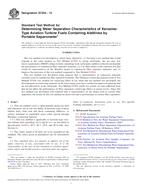 ASTM D7224-13
ASTM D7224-13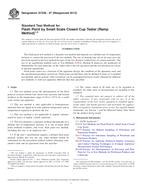 ASTM D7236-07(2013)..
ASTM D7236-07(2013)..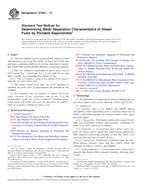 ASTM D7261-13
ASTM D7261-13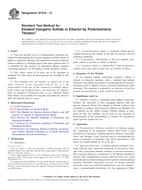 ASTM D7318-13
ASTM D7318-13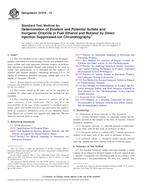 ASTM D7319-13
ASTM D7319-13
 Cookies
Cookies
